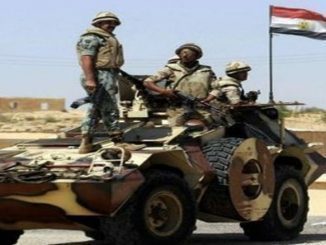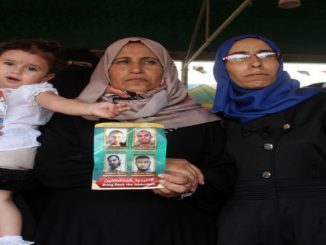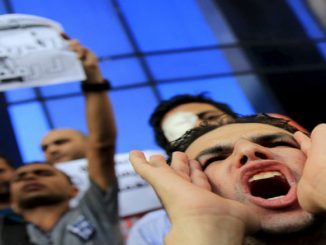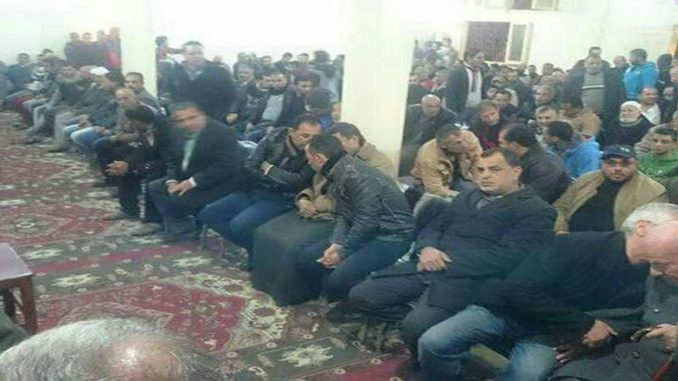
A group from Al-Arish residents, in Northern Sinai governorate, have announced beginning partial civil disobedience next Thursday (on February 11), in protest against the extrajudicial killing of 10 youths by security forces.
This month, Egypt’s Interior Ministry announced that the police killed 10 Islamic militants in a shootout in al-Arish. However, Al-Arish residents said that those who were killed had been in police custody since October.
In this context, Al-Arish Popular Committee, which includes representatives from several tribes, stated in a statement that the first steps of civil disobedience will be partial, and that they will not pay the electricity or water bills to the government.
Moreover, the Popular Committee also called for a meeting for all North Sinai cities this month on February 25 to discuss the recent developments.
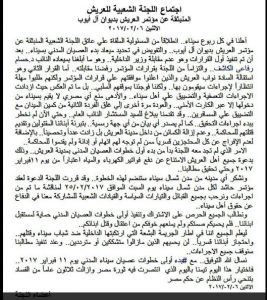
In addition, it pointed that, “The first decision of Al-Arish residents’ conference, which was held last month to reject a proposed meeting with the minister of interior Magdy Abd al-Ghaffar was implemented,” adding that,”On the other hand, Al-Arish members of parliament (2 out of 596) have not submitted their resignation as they pledged before in Al-Arish residents’ conference,”according to their statement.
The statement also reads,”We have chosen February 11, the victory day for the Egyptian Revolution that toppled 30 years of corruption, and overthrew the head of the regime,” pointing to the overthrowing of Hosni Mubarak on January Revolution 2011.
Last month, a video of Al-Arish residents meeting was circulated online showing around 100 people gathered in the home of a prominent al-Arish family, according to the Associated Press.
They called for the release of youths detained without charge by Egypt’s security forces and the trial of anyone who took part in the alleged extrajudicial killings of their sons.
In the meeting, the residents labelled Egypt’s interior minister “an enemy of the state,” and called on Sinai lawmakers to quit parliament in protest as well as the formation of a “popular committee” that would be tasked with organizing future protests, according to their statement.
Al-Arish leader said at the meeting, “Listen ruler of Egypt [Abdel Fattah al-Sisi], the sons of Al-Arish and the sons of Sinai are one hand.”
He added, “They will select a committee to speak on their behalf. They don’t feel that their sons are safe in your jails. They want all of them released immediately, especially those who have no court rulings issued against them.”
He also said, “They also want to bring to justice all those who killed our sons. Otherwise, we will bring them to justice our way.”
Moreover, the residents threatened to begin a civil disobedience campaign unless their demands were met within seven days.
In the same context, Sinai Organization for Human Rights, an international non-governmental organization that monitors, supervises and documents the human rights situation in Egypt’s Sinai region, said that the victims were under enforced disappearance for a long period of time and their relatives didn’t know how to contact them as they didn’t know their whereabouts or their custody places.
The rights group also stated that it has documented the victims’ names, ages, their addresses when they were arrested and the conditions behind their arrest.
According to statement released by the group, “Sinai Organization for Human Rights has been briefed that the Egyptian police forces in cooperation with Armed have committed extrajudicial killings against civilians in their custody and they have been placed in a civilian site, which was described later as “a terrorist den” and photographed them as if they were plotting to carry out an operation against the security forces,” adding that, “these were common claims raised by the authorities in Egypt against those whom they exterminated.”
The rights group continued, “According to information obtained by the organization, what happened to those victims should be named as “massacres”, and Sinai for Human Rights expresses its grave concern over the of extrajudicial killings operations carried out by the Egyptian authorities against Sinai residents, and for not bringing those responsible for these crimes into justice, as well as its reluctance in conducting an urgent and serious investigations to stop the recurrence of such incidents, which gives a green light to kill and assassinate more civilians without any deterrence.”
Since Abdel Fattah al-Sisi reached power in a military coup in 2013 that overthrew Egypt’s first democratically elected President Mohamed Morsi, Sinai people have been the victims of human rights violations as well as eviction from their homeland.
The residents of the northern Sinai region often complain of heavy-handed tactics by security forces, including collective punishment following particularly deadly attacks against government forces.
In fact, the security campaign grew more deadly and vigorous as the Egyptian military and police forces have been the target of ongoing attacks which have increased since the military coup in 2013.
Ansar Beit al-Maqdis, the militant group responsible for a majority of attacks on military personnel, aligned with the Islamic State group in November 2014, changing its name to “Sinai Province”.
Sinai Province has targeted Egypt’s security forces in various attacks, mostly roadside bombings, and ambushes, as well as operations against security checkpoints.
As a result, the Egyptian armed forces launched an excessive campaign to uproot ISIS from the eastern peninsula bordering Israel and the Palestinian Gaza Strip.
However, Sinai civilians have increasingly been targeted in the crossfire between security services and Islamic militants.
In addition, the Egyptian government is accused of killing suspects in detention before claiming they were killed in shootouts.
According to a Human Rights Watch, the government said that its counter-terrorism operations in north Sinai killed at least 3,091 “terrorists” between January and July 2015.
According to Arab Organization for Human Rights, a London-based organization, reported that more than 361 people were killed in Sinai by the Egyptian army in 2014 for allegedly being wanted for terrorist activities.
The government releases little information about such operations and threatens journalists who report about them.
In August, Abdel Fattah al-Sisi issued a law that provides for a fine of up to 500,000 Egyptian pounds (US$64,000) and a year-long work ban for anyone who reports information about terrorism that contradict the government.
In addition, nearly 1481 people have been arrested for the same reasons without a shred of evidence or legal due process, the organization said.
Moreover, the Egyptian armed forces was accused by violating international law for the mass home demolitions and forced eviction of about 3,200 families in the Sinai Peninsula over the past two years,according to a report released by Human Rights Watch in 2015.
The 84-page report, “Look for Another Homeland,” documents the Egyptian government’s failure to provide adequately for residents during and after evictions in North Sinai. “Since July 2013, ostensibly to eliminate the threat of smuggling tunnels, the military has arbitrarily razed thousands of homes in a once-populated buffer zone on the border with the Gaza Strip, destroying entire neighborhoods and hundreds of hectares of farmland,” the rights group said.
“Destroying homes, neighborhoods, and livelihoods is a textbook example of how to lose a counterinsurgency campaign,” said Sarah Leah Whitson, Middle East and North Africa director.

